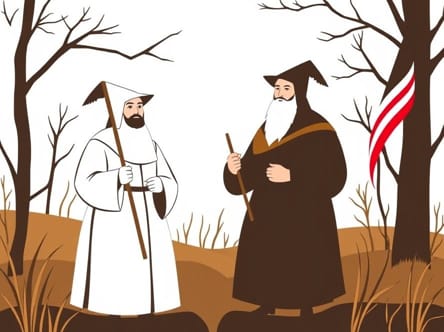During the American Revolutionary War, the Quakers, also known as the Religious Society of Friends, faced a profound moral and social dilemma. Their core principles pacifism, integrity, and equality stood in stark contrast to the political upheaval and violence of the time. While the colonies moved toward war against British rule, Quakers struggled with how to maintain their religious values in the face of rising nationalist fervor. Their refusal to take sides, bear arms, or swear allegiance to either the Continental or British forces often placed them in a precarious position, both politically and socially. Their experiences during the war reveal the complexities of maintaining neutrality and religious integrity in a time of intense division and war.
Origins of Quaker Beliefs
To understand the role of the Quakers during the Revolutionary War, it is important to examine their foundational beliefs. Emerging in the 17th century in England, Quakers emphasized a direct personal experience with God, the ‘Inner Light,’ over formal religious institutions. They rejected violence in any form, swearing of oaths, and hierarchical social structures.
By the 18th century, Quaker communities had flourished in parts of the American colonies, particularly in Pennsylvania, which was founded by the Quaker William Penn as a haven for religious tolerance. These communities adhered to strict moral codes and were known for their emphasis on education, honesty, and peaceful coexistence.
Pacifism and the War Dilemma
The Revolutionary War posed a direct challenge to Quaker pacifism. As violence between colonial militias and British troops escalated, pressure mounted on all colonists to declare allegiance. Patriots demanded support in the form of money, troops, and supplies. Quakers, however, refused to fight or support the war effort on either side, adhering strictly to their testimony of peace.
This neutrality was often misinterpreted as Loyalist sympathy. Many colonial revolutionaries viewed Quakers with suspicion, accusing them of aiding the enemy. Some were fined, imprisoned, or exiled for refusing to swear loyalty to the revolutionary cause. Their position made them vulnerable to both British and American aggression, even though they actively supported neither side.
Quaker Discipline and Internal Conflict
Even within the Quaker community, the war caused internal tension. While most Friends remained committed to pacifism, a small number, known as ‘Free Quakers,’ broke from traditional doctrine to support the revolution. These individuals believed that the struggle for independence aligned with moral principles such as liberty and justice. Their decision created a schism, and they were often disowned by the broader Quaker community for violating pacifist teachings.
The larger body of Quakers responded to these challenges by reinforcing their commitment to nonviolence and religious discipline. The Philadelphia Yearly Meeting, a leading Quaker organizational body, issued directives discouraging members from participating in war-related activities. Those who did not comply faced disownment or exclusion from religious fellowship.
Persecution and Social Consequences
During the war, the persecution of Quakers was widespread. Patriots often saw them as unpatriotic or traitorous, while Loyalists mistrusted their neutrality. In states like Pennsylvania and New York, laws were enacted requiring loyalty oaths. Quakers who refused these oaths were often denied basic civil rights, such as the ability to vote, hold office, or serve on juries.
Many Quaker meeting houses were vandalized or occupied by troops. Prominent members of the community were imprisoned or exiled, sometimes without formal charges. In 1777, over a dozen Quaker leaders in Pennsylvania were arrested and exiled to Virginia by order of the Continental Congress, despite no evidence of treasonous activity.
Efforts to Maintain Community Welfare
Despite persecution, Quakers remained active in nonviolent ways. They organized relief efforts, provided food and shelter to displaced families, and advocated for the humane treatment of prisoners. Their belief in equality also led them to continue efforts toward abolitionism, even during wartime. Quaker communities were some of the earliest to condemn slavery and advocate for manumission.
Their quiet but consistent commitment to humanitarian values stood in contrast to the violence and chaos of the time. In many areas, their integrity and charitable actions eventually earned them grudging respect, even from those who had once been suspicious of their neutrality.
Legacy of Quaker Involvement
In the aftermath of the Revolutionary War, Quakers continued to play a significant role in shaping American society. Though their pacifism kept them on the fringes of revolutionary politics, their consistent moral stance provided an enduring example of principled dissent. Their resistance to violence, refusal to compromise on ethical beliefs, and emphasis on community welfare left a powerful legacy in American religious and political history.
The war strengthened Quaker resolve to remain separate from political affairs, yet it also highlighted the importance of civic engagement in promoting social justice. In the decades following independence, Quakers became prominent leaders in the abolitionist movement, prison reform, and women’s rights campaigns.
Reflection on the Quaker Position
The Quakers during the Revolutionary War were neither traitors nor blind patriots. They represented a third way a moral resistance that neither celebrated war nor condoned tyranny. Their steadfast commitment to peace and social justice, even in the face of persecution, challenged the prevailing belief that loyalty must be proven through violence or political alignment.
Their experience reminds us that neutrality does not imply indifference and that in times of war, moral courage can take many forms. The story of the Quakers offers valuable insight into how individuals and communities navigate the tension between personal convictions and societal pressure.
Quakers during the Revolutionary War maintained a unique and principled stance, defined by their unwavering commitment to peace and integrity. Their neutrality was not a sign of weakness, but of moral strength, grounded in centuries-old spiritual beliefs. Despite persecution and suspicion from both sides, they chose a path of nonviolence and compassion. Their legacy continues to inspire those who seek to uphold justice without resorting to violence. In a world often divided by conflict, the Quaker example during the Revolutionary War serves as a powerful testament to the strength of conscience and the enduring value of peace.
